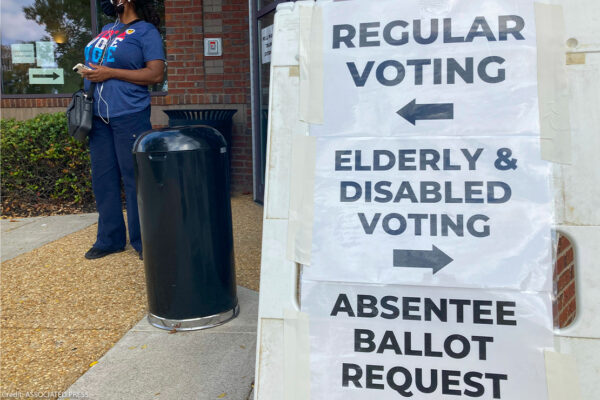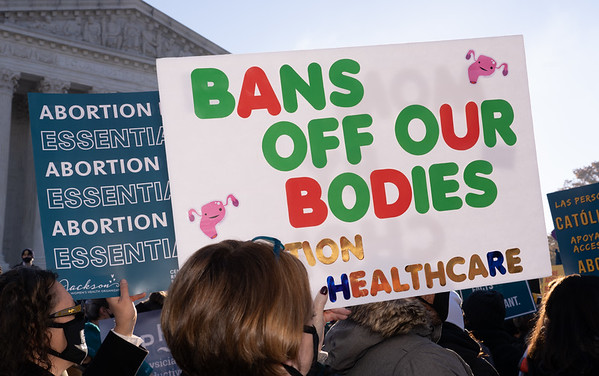Mississippi
Dobbs v. Jackson Women’s Health Organization
The case concerns the constitutionality of a Mississippi law prohibiting abortions after the fifteenth week of pregnancy. The state used the case as a vehicle to ask the Supreme Court to take away the federal constitutional right to abortion it first recognized 50 years before in Roe v. Wade. On June 24, 2022, the Supreme Court of the United States accepted the state’s invitation and overturned Roe eliminating the federal constitutional right to abortion.
Status: Closed (Judgment)
View Case
Visit ACLU of Mississippi
Featured
Mississippi
Mar 2017

Smart Justice
Prisoners' Rights
Dockery v. Hall
The ACLU, the Southern Poverty Law Center (SPLC), the Law Offices of Elizabeth Alexander, and the law firm of Covington & Burling LLP, filed a petition for class certification and expert reports for a federal lawsuit on behalf of prisoners at the East Mississippi Correctional Facility (EMCF). The lawsuit, which was filed in May 2013, describes the for-profit prison as hyper-violent, grotesquely filthy and dangerous. EMCF is operated "in a perpetual state of crisis" where prisoners are at "grave risk of death and loss of limbs." The facility, located in Meridian, Mississippi, is supposed to provide intensive treatment to the state's prisoners with serious psychiatric disabilities, many of whom are locked down in long-term solitary confinement.
All Cases
22 Mississippi Cases

Mississippi
Sep 2024
Voting Rights
Republican National Committee v. Wetzel (Amicus)
In 2020, in a nearly unanimous bipartisan vote, Mississippi joined eighteen other states in accepting mail ballots postmarked by Election Day that arrived after Election Day (in Mississippi’s case, up to five business days). This lawsuit by partisan actors seeks to disenfranchise these voters whose ballot is mailed by Election Day but—through no fault of their own—does not arrive until afterwards. In Mississippi, this harm will fall disproportionately on voters with disabilities, older voters, and other communities that rely upon absentee voting. Twisting the words and meaning of Congress, the RNC argues that three longstanding federal laws that set a uniform election day for federal races require that ballot may only be counted if they are received by election officials by Election Day. If accepted, this radical argument would not only disenfranchise thousands upon thousands of voters in Mississippi and eighteen other states, but also upend election administration in every state.
Explore case
Mississippi
Sep 2024

Voting Rights
Republican National Committee v. Wetzel (Amicus)
In 2020, in a nearly unanimous bipartisan vote, Mississippi joined eighteen other states in accepting mail ballots postmarked by Election Day that arrived after Election Day (in Mississippi’s case, up to five business days). This lawsuit by partisan actors seeks to disenfranchise these voters whose ballot is mailed by Election Day but—through no fault of their own—does not arrive until afterwards. In Mississippi, this harm will fall disproportionately on voters with disabilities, older voters, and other communities that rely upon absentee voting. Twisting the words and meaning of Congress, the RNC argues that three longstanding federal laws that set a uniform election day for federal races require that ballot may only be counted if they are received by election officials by Election Day. If accepted, this radical argument would not only disenfranchise thousands upon thousands of voters in Mississippi and eighteen other states, but also upend election administration in every state.

Mississippi
Aug 2024
Voting Rights
Disability Rights Mississippi v. Fitch
A law passed in 2023 significantly diminishes access to the ballot for Mississippians with disabilities by restricting who may return an absentee ballot for a voter to only a narrow category of assistors. We’re suing to block this law.
Explore case
Mississippi
Aug 2024

Voting Rights
Disability Rights Mississippi v. Fitch
A law passed in 2023 significantly diminishes access to the ballot for Mississippians with disabilities by restricting who may return an absentee ballot for a voter to only a narrow category of assistors. We’re suing to block this law.

Mississippi
Aug 2024
Voting Rights
White v. Mississippi State Board of Elections
District lines used to elect Mississippi’s Supreme Court have gone unchanged for more than 35 years. We’re suing because this dilutes the voting strength of Black residents in state Supreme Court elections, in violation of the Voting Rights Act and the U.S. Constitution.
Explore case
Mississippi
Aug 2024

Voting Rights
White v. Mississippi State Board of Elections
District lines used to elect Mississippi’s Supreme Court have gone unchanged for more than 35 years. We’re suing because this dilutes the voting strength of Black residents in state Supreme Court elections, in violation of the Voting Rights Act and the U.S. Constitution.

U.S. Supreme Court
Jul 2024
Capital Punishment
Galloway v. Mississippi
In Galloway v. Mississippi, the ACLU represents a man on Mississippi’s death row whose trial attorneys relied on a mere twenty-two-page presentation in support of a life sentence, without first conducting the background investigation that would have enabled them to make informed decisions about what evidence to present. A constitutionally adequate investigation would have uncovered voluminous mitigating evidence that could have caused the jury to decide for life instead of death. The Mississippi Supreme Court rejected Mr. Galloway’s claim by speculating that trial counsel had an alternative “strategy” that precluded their doing a full presentation of the abuse he suffered as a child and his mental disabilities—even though Mr. Galloway’s lawyers asserted no such strategic judgment.
Explore case
U.S. Supreme Court
Jul 2024

Capital Punishment
Galloway v. Mississippi
In Galloway v. Mississippi, the ACLU represents a man on Mississippi’s death row whose trial attorneys relied on a mere twenty-two-page presentation in support of a life sentence, without first conducting the background investigation that would have enabled them to make informed decisions about what evidence to present. A constitutionally adequate investigation would have uncovered voluminous mitigating evidence that could have caused the jury to decide for life instead of death. The Mississippi Supreme Court rejected Mr. Galloway’s claim by speculating that trial counsel had an alternative “strategy” that precluded their doing a full presentation of the abuse he suffered as a child and his mental disabilities—even though Mr. Galloway’s lawyers asserted no such strategic judgment.

Mississippi
Jul 2024
Free Speech
Privacy & Technology
NetChoice v. Fitch
Whether a law that mandates age verification for all users of social media services violates the First Amendment.
Explore case
Mississippi
Jul 2024

Free Speech
Privacy & Technology
NetChoice v. Fitch
Whether a law that mandates age verification for all users of social media services violates the First Amendment.
